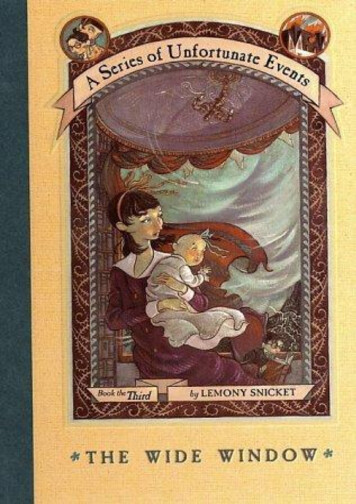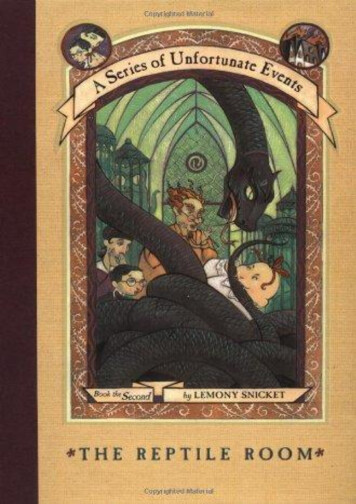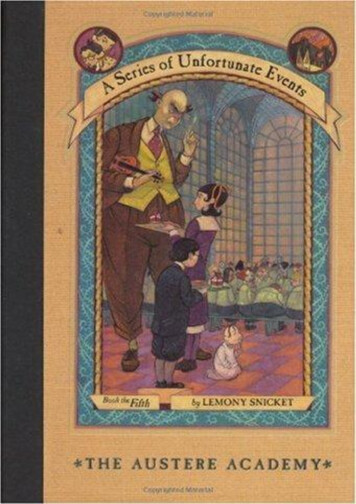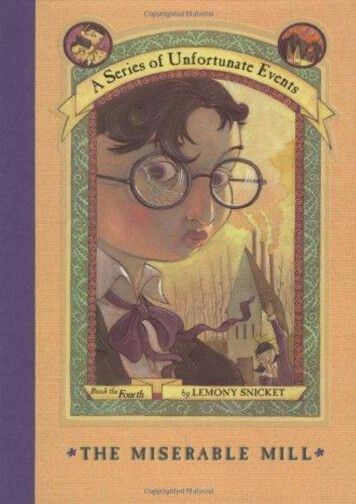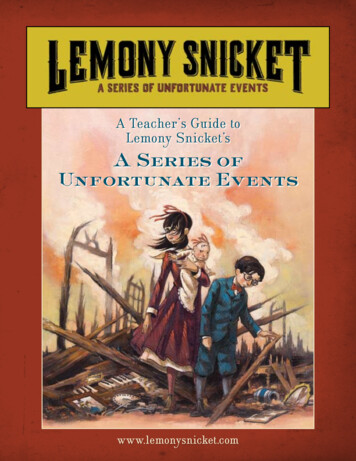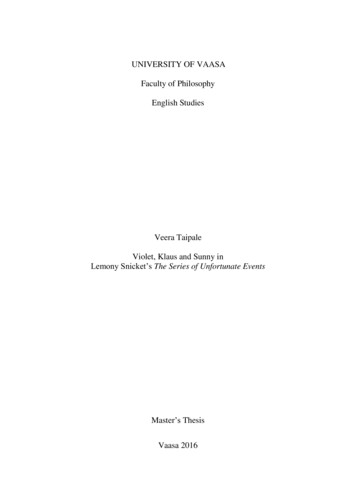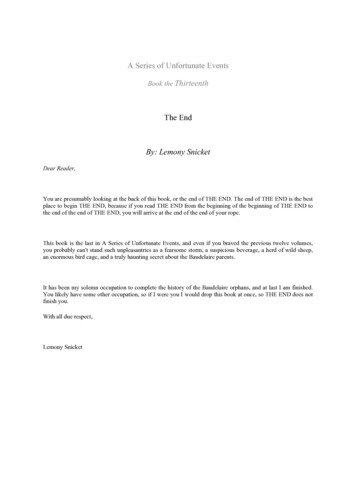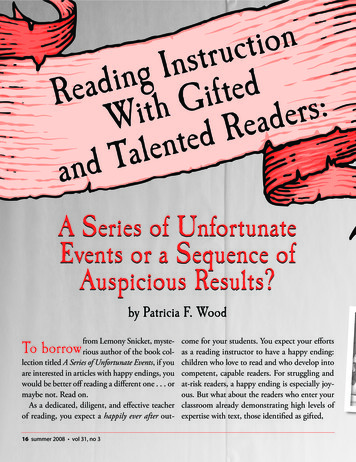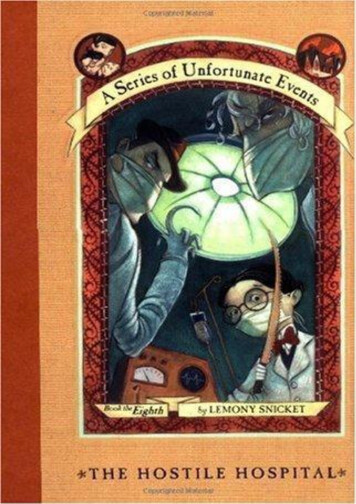
Transcription
A Series of Unfortunate Events 8 - TheHostile HospitalASeriesofUnfortunateEventsA Series of Unfortunate EventsBook the EighthThe Hostile HospitalLemony SnicketCHAPTEROneThere are two reasons why a writer would end a sentence with the word “stop”written entirely in capital letters STOP. The first is if the writer were writing atelegram, which is a coded message sent through an electrical wire STOP. In atelegram, the word “stop” in all capital letters is the code for the end of a sentenceSTOP. But there is another reason why a writer would end a sentence with “stop”written entirely in capital letters, and that is to warn readers that the book they arereading is so utterly wretched that if they have begun reading it, the best thing to dowould be to stop STOP. This particular book, for instance, describes an especiallyunhappy time in the dreadful lives of Violet, Klaus, and Sunny Baudelaire, and if youhave any sense at all you will shut this book immediately, drag it up a tall mountain,and throw it off the very top STOP. There is no earthly reason why you should readeven one more word about the misfortune, treachery, and woe that are in store for thethree Baudelaire children, any more than you should run into the street and throwyourself under the wheels of a bus STOP. This “stop”-ended sentence is your verylast chance to pretend the “STOP” warning is a stop sign, and to stop the flood ofdespair that awaits you in this book, the heart-stopping horror that begins in the verynext sentence, by obeying the “STOP” and stopping STOP.
The Baudelaire orphans stopped. It was early in the morning, and the threechildren had been walking for hours across the flat and unfamiliar landscape. Theywere thirsty, lost, and exhausted, which are three good reasons to end a long walk,but they were also frightened, desperate, and not far from people who wanted to hurtthem, which are three good reasons to continue. The siblings had abandoned allconversation hours ago, saving every last bit of their energy to put one foot in front ofthe other, but now they knew they had to stop, if only for a moment, and talk aboutwhat to do next.The children were standing in front of the Last Chance General Store-the onlybuilding they had encountered since they began their long and frantic nighttime walk.The outside of the store was covered with faded posters advertising what was sold,and by the eerie light of the half-moon, the Baudelaires could see that fresh limes,plastic knives, canned meat, white envelopes, mango-flavored candy, red wine,leather wallets, fashion magazines, goldfish bowls, sleeping bags, roasted figs,cardboard boxes, controversial vitamins, and many other things were available insidethe store. Nowhere on the building, however, was there a poster advertising help,which is really what the Baudelaires needed.“I think we should go inside,” said Violet, taking a ribbon out of her pocket to tieup her hair. Violet, the eldest Baudelaire, was probably the finest fourteen-year-oldinventor in the world, and she always tied her hair up in a ribbon when she had tosolve a problem, and right now she was trying to invent a solution for the biggestproblem she and her siblings had ever faced. “Perhaps there’s somebody in there whocan help us in some way.”“But perhaps there’s somebody in there who has seen our pictures in thenewspaper,” said Klaus, the middle Baudelaire, who had recently spent his thirteenthbirthday in a filthy jail cell. Klaus had a real knack for remembering nearly everyword of nearly all of the thousands of books he had read, and he frowned as heremembered something untrue he had recently read about himself in the newspaper.“If they read The Daily Punctilio,”he continued, “perhaps they believe all thoseterrible things about us. Then they won’t help us at all.”“Agery!” Sunny said. Sunny was a baby, and as with most babies, different partsof her were growing at different rates. She had only four teeth, for example, but eachof them was as sharp as that of an adult lion, and although she had recently learned towalk, Sunny was still getting the hang of speaking in a way that all adults couldunderstand. Her siblings, however, knew at once that she meant “Well, we can’t keepon walking forever,” and the two older Baudelaires nodded in agreement.“Sunny’s right,” Violet said. “It’s called the Last Chance General Store. Thatsounds like it’s the only building for miles and miles. It might be our onlyopportunity to get some help.”“And look,” Klaus said, pointing to a poster taped in a high corner of the building.“We can send a telegram inside. Maybe we can get some help that way.”“Who would we send a telegram to?” Violet asked, and once again the Baudelaireshad to stop and think. If you are like most people, you have an assortment of friends
and family you can call upon in times of trouble. For instance, if you woke up in themiddle of the night and saw a masked woman trying to crawl through your bedroomwindow, you might call your mother or father to help you push her back out. If youfound yourself hopelessly lost in the middle of a strange city, you might ask thepolice to give you a ride home. And if you were an author locked in an Italianrestaurant that was slowly filling up with water, you might call upon youracquaintances in the locksmith, pasta, and sponge businesses to come and rescue you.But the Baudelaire children’s trouble had begun with the news that their parents hadbeen killed in a terrible fire, so they could not call upon their mother or father. Thesiblings could not call upon the police for assistance, because the police were amongthe people who had been chasing them all night long. And they could not call upontheir acquaintances, because so many of the children’s acquaintances were unable tohelp them. After the death of the Baudelaire parents, Violet, Klaus, and Sunny hadfound themselves under the care of a variety of guardians. Some of them had beencruel. Some of them had been murdered. And one of them had been Count Olaf, agreedy and treacherous villain who was the real reason they were all by themselves inthe middle of the night, standing in front of the Last Chance General Store,wondering who in the world they could call upon for help.“Poe,” Sunny said finally. She was talking about Mr. Poe, a banker with a nastycough, who was in charge of taking care of the children following their parents’death. Mr. Poe had never been particularly helpful, but he was not cruel, murdered, orCount Olaf, and those seemed to be reasons enough to contact him.“I guess we could try Mr. Poe,” Klaus agreed. “The worst he could do would be tosay no.”“Or cough,” Violet said with a small smile. Her siblings smiled back, and the threechildren pushed open the rusty door and walked inside.“Lou, is that you?” called out a voice, but the children could not see who itbelonged to. The inside of the Last Chance General Store was as crowded as itsoutside, with every inch of space crammed full of things for sale. There were shelvesof canned asparagus and racks of fountain pens, next to barrels of onions and cratesfull of peacock feathers. There were cooking utensils nailed to the walls andchandeliers hanging from the ceiling, and the floor was made out of thousands ofdifferent kinds of tiles, each one stamped with a price tag. “Are you delivering themorning paper?” the voice asked.“No,” Violet replied, as the Baudelaires tried to make their way toward the personwho was talking. With difficulty they stepped over a carton of cat food and rounded acorner, only to find rows and rows of fishnets blocking their way.“I’m not surprised, Lou,” the voice continued, as the siblings doubled back past astack of mirrors and a pile of socks and headed down an aisle filled with pots of ivyand books of matches. “I usually don’t expect The Daily Punctilio until after theVolunteers Fighting Disease arrive.”The children stopped looking for the source of the voice for a moment, and lookedat one another, thinking of their friends Duncan and Isadora Quagmire. Duncan and
Isadora were two triplets who, like the Baudelaires, had lost their parents, along withtheir brother, Quigley, in a terrible fire. The Quagmires had fallen into Olaf’s hands acouple of times and had only recently escaped, but the Baudelaires did not know ifthey would see their friends ever again or learn a secret that the triplets haddiscovered and written down in their notebooks. The secret concerned the initialsV.F.D., but the only other clues that the Baudelaires had were a few pages fromDuncan’s and Isadora’s notebooks, and the three siblings had scarcely found the timeto look them over. Could Volunteers Fighting Disease finally be the answer thechildren were searching for?“No, we’re not Lou,” Violet called out. “We’re three children, and we need to senda telegram.”“A telegram?” called the voice, and as the children rounded another corner theyalmost ran right into the man who was talking to them. He was very short, shorterthan both Violet and Klaus, and looked like he hadn’t slept or shaved in quite a longtime. He was wearing two different shoes, each with a price tag, and several shirtsand hats at once. He was so covered in merchandise that he almost looked like part ofthe store, except for his friendly smile and dirty fingernails.“You’re certainly not Lou,” he said. “Lou is one chubby man, and you are threeskinny children. What are you doing around here so early? It’s dangerous aroundhere, you know. I’ve heard that this morning’s Daily Punctiliohas a story about threemurderers who are lurking around this very neighborhood, but I haven’t read it yet.”“Newspaper stories aren’t always accurate,” Klaus said nervously.The shopkeeper frowned. “Nonsense,” he said. “The Daily Punctilio wouldn’tprint things that aren’t true. If the newspaper says somebody is a murderer, then theyare a murderer and that’s the end of it. Now, you say you wanted to send a telegram?”“Yes,” Violet said. “To Mr. Poe at Mulctuary Money Management, in the city.”“It will cost quite a bit of money to send a telegram all the way to the city,” theshopkeeper said, and the Baudelaires looked at one another in dismay.“We don’t have any money with us,” Klaus admitted. “We’re three orphans, andthe only money we have is being looked after by Mr. Poe. Please, sir.”“Sos!” Sunny said.“My sister means ‘It’s an emergency situation,’” Violet explained, “and it is.”The shopkeeper looked at them for a moment, and then shrugged. “If it’s really anemergency situation,” he said, “then I won’t charge you. I never charge anything forthings if they’re really important. Volunteers Fighting Disease, for instance.Whenever they stop by, I give them gasoline for free because they do such wonderfulwork.”“What exactly do they do?” Violet asked.“They fight disease, of course,” the shopkeeper replied. “V.F.D. stop by hereearly each morning on their way to the hospital. Every day they devote themselves to
cheering up patients, and I don’t have the heart to charge them for anything.”“You’re a very kind man,” Klaus replied.“Well, it’s very kind of you to say so,” the shopkeeper replied. “Now, the devicefor sending telegrams is over there, next to all those porcelain kittens. I’ll help you.”“We can do it ourselves,” Violet said. “I built one of those devices myself when Iwas seven, so I know how to connect the electronic circuit.”“And I’ve read two books about Morse code,” Klaus said. “So I can translate ourmessage into electronic signals.”“Help!” Sunny said.“What a talented group of children,” the shopkeeper said with a smile. “Well, I’llleave you three alone. I hope that this Mr. Poe person can help you with youremergency situation.”“Thank you very much, sir,” Violet said. “I hope so, too.”The shopkeeper gave the children a little wave and disappeared behind a display ofpotato peelers, and the Baudelaires looked at one another in excitement.“Volunteers Fighting Disease?” Klaus whispered to Violet. “Do you think we’vefinally found the real meaning of V.F.D.?”“Jacques!” Sunny said.Jacques did say something about working as a volunteer,“ Klaus agreed. ”If onlywe had a few moments to look over the pages from the Quagmire notebooks. They’restill in my pocket.”“First things first,” Violet said. “Let’s send the telegram to Mr. Poe. If Lou deliversthis morning’s Daily Punctilio, the shopkeeper is going to stop thinking we’re agroup of talented children and start thinking we’re murderers.”“You’re right,” Klaus said. “After Mr. Poe gets us out of this mess, we’ll have timeto think about these other things.”“Trosslik,” Sunny said. She meant something along the lines of, “You mean if Mr.Poe gets us out of this mess,” and her siblings nodded grimly and went over to take alook at the telegram device. It was an arrangement of dials, wires, and strange metalimplements that I would have been too scared to even touch, but the Baudelairesapproached it with confidence.“I’m pretty sure we can operate this,” Violet said. “It looks fairly simple. See,Klaus, you use these two metal strips to tap out the message in Morse code, and I willconnect the circuit over here. Sunny, you stand here and put on these earphones tomake sure you can hear the signal being transmitted. Let’s step to it.”The children stepped to it, a phrase which here means “took their positions aroundthe telegram device.” Violet turned a dial, Sunny put on her earphones, and Klauswiped the lenses of his glasses so he could be sure to see what he was doing. Thesiblings nodded at one another, and Klaus began to speak out loud as he tapped out
the message in code.“To: Mr. Poe at Mulctuary Money Management,” Klaus said. “From: Violet,Klaus, and Sunny Baudelaire. Please do not believe the story about us printed in TheDaily Punctilio STOP. Count Olaf is not really dead, and we did not really murderhim STOP.”“Arrete?” Sunny asked.“‘STOP’ is the code for the end of a sentence,” Klaus explained. “Now, whatshould I say next?”Soon after our arrival in the town of V.F.D. we were informed that Count Olaf hadbeen captured STOP,“ Violet dictated. ”Although the arrested man had an eyetattooed on his ankle and one eyebrow instead of two, he was not Count Olaf STOP.His name was Jacques Snicket STOP.”“The next day he was found murdered, and Count Olaf arrived in town along withhis girlfriend, Esmé Squalor STOP,” Klaus continued, tapping away. “As part of hisplan to steal the fortune our parents left behind, Count Olaf disguised himself as adetective and convinced the town of V.F.D. that we were the murderers STOP.”“Uckner,” Sunny suggested, and Klaus translated what she said into English, andthen into Morse code: “Meanwhile we discovered where the Quagmire triplets werebeing hidden, and helped them escape STOP. The Quagmires managed to give us afew scraps of their notebooks so we could try to learn the real meaning of V.F.D.STOP.”“We have managed to flee from the citizens of the town, who want to burn us atthe stake for a murder that we did not commit STOP,” Violet said, and Klaus quicklytapped the sentence out into code before adding two last sentences of his own.“Please reply at once STOP. We are in grave danger STOP.”Klaus tapped out the last P in “STOP” and then looked at his sisters. “We are ingrave danger,” he said again, although his hand did not move on the device.“You already sent that sentence,” Violet said.“I know,” Klaus said quietly. “I wasn’t putting it into the telegram again. I was justsaying it. We are in grave danger. It’s almost as if I didn’t realize how grave thedanger was until I tapped it out into a telegram.”‘Ilimi,” Sunny said, and took off her earphones so she could lay her head onKlaus’s shoulder.“I’m scared, too,“ Violet admitted, patting her sister’s shoulder. ”But I’m sure Mr.Poe will help us. We can’t be expected to solve this problem all by ourselves.”“But that’s how we’ve solved every other problem,” Klaus said, “ever since thefire. Mr. Poe has never done anything except send us to one disastrous home afteranother.”“He’ll help us this time,” Violet insisted, although she did not sound very sure.“Just watch the device. He’ll send back a telegram any moment now.”
“But what if he doesn’t?” Klaus asked.“Chonex,” Sunny murmured, and wriggled closer to her siblings. She meantsomething along the lines of “Then we’re all alone,” which is a curious thing to saywhen you are with your two siblings, in the middle of a store so stuffed withmerchandise you can hardly move. But as they sat closely together, looking at thetelegram device, it did not seem curious to the Baudelaires. They were surrounded bynylon rope, floor wax, soup bowls, window curtains, wooden rocking horses, tophats, fiber-optic cable, pink lipstick, dried apricots, magnifying glasses, blackumbrellas, slender paintbrushes, French horns, and each other, but as the Baudelaireorphans sat and waited for a reply to their telegram, they only felt more and morealone.fierce weasels, or perhaps they are wedged tightly between two refrigerators andcannot get themselves out. The expression might well be changed to “No news is badnews,” except that people may not be able to contact you because they have just beencrowned king or are competing in a gymnastics tournament. The point is that there is noway to know why someone has not contacted you, until they contact you and explainthemselves. For this reason, the sensible expression would be “No news is no news,”except that it is so obvious it is hardly an expression at all.Obvious or not, however, it is the proper way to describe what happened to theBaudelaires after they sent the desperate telegram to Mr. Poe. Violet, Klaus, andSunny sat and stared at the telegram device for hours, waiting for some sign of thebanker’s reply. As the hour grew later and later, they took turns dozing against themerchandise of the Last Chance General Store, hoping for any response from theman who was in charge of the orphans’ affairs. And as the first few rays of dawnshone through the window, illuminating all of the price tags in the store, the onlynews the children had received was that the shopkeeper had made some freshcranberry muffins.“I’ve made some fresh cranberry muffins,” the shopkeeper said, peeking around atower of flour sifters. He was wearing at least two pot holders on each hand and wascarrying the muffins on a stack of different-colored trays. “Normally I would putthem up for sale, between the phonograph records and the garden rakes, but I hate tothink of you three children going without breakfast when there are vicious murdererson the loose, so have some for yourself, free of charge.”“That’s very kind of you,” Violet said, as she and her siblings each took a muffinfrom the shopkeeper’s top tray. The Baudelaires, who had not eaten since they left thevillage, soon made short work-a phrase which here means “ate every warm, sweetcrumb”-of the pastries.“Goodness, you’re hungry,” the shopkeeper said. “Did everything go all right withthe telegram? Have you received a reply?”“Not yet,” Klaus said.“Well, don’t worry your tiny heads about it,” the shopkeeper replied. “Remember,no news is good news.”
“No news is good news?” called out a voice from somewhere in the store. “I havesome news for you, Milt. All about those murderers.”“Lou!” the shopkeeper called in delight, and then turned to the children. “Excuseme, please,” he said. “Lou’s here with The Daily Punctilio.”The shopkeeper walked through a bunch of rugs hanging from the ceiling, and theBaudelaires looked at one another in dismay.“What’ll we do?” Klaus whispered to his sisters. “If the newspaper has arrived, theshopkeeper will read that we’re murderers. We’d better run away.”“But if we run away,” Violet said, “Mr. Poe won’t be able to contact us.”“Gykree!” Sunny cried, which meant “He’s had all night to contact us, and wehaven’t heard from him.”“Lou?” they heard the shopkeeper call out. “Where are you, Lou?”“I’m over by the pepper grinders,” the delivery person called out in return. “Andwait till you read this story about the three murderers of that Count. It’s got picturesand everything. I saw the police on the way here, and they said they were closing in.The only people they allowed in the area were me and those volunteer people.They’re going to capture those kids and send them right to jail.”“Kids?“ the shopkeeper said. ”The murderers are kids?”“Yep,“ the delivery person replied. ”See for yourself.”The children looked at one another, and Sunny gave a little whimper of fear.Across the store they could hear the rustling of paper and then the excited voice ofthe shopkeeper.“I know those kids!” he cried. “They’re in my store right now! I just gave themsome muffins!”“You gave muffins to murderers?” Lou said. “That’s not right, Milt. Criminalsshould be punished, not fed pastries.”“I didn’t know they were murderers then,” the shopkeeper explained, “but I sureknow now. It says so right here in The Daily Punctilio. Call the police, Lou! I’ll grabthese murderers and make sure they don’t escape.”The Baudelaires wasted no more time, and began to run in the opposite directionfrom the men’s voices, down an aisle of safety pins and candy canes. “Let’s headtoward those ceramic ashtrays,” Violet whispered. “I think we can exit that way.”“But what happens when we exit?” Klaus whispered back. “The delivery personsaid that the police were closing in.”“Mulick!” Sunny cried, which meant “Let’s discuss that at a later time!”“Egad!” The children could hear the shopkeeper’s surprised voice from severalaisles over. “Lou, the kids aren’t here! Keep an eye out for them.”“What do they look like?” the delivery-person called back.
“They look like three innocent children,” the shopkeeper said, “but they’re reallyvicious criminals. Be careful.”The children ran around a corner and ducked into the next aisle, pressingthemselves against a rack of construction paper and canned peas as they listened tothe hurrying footsteps of the delivery person. “Wherever you murderers are,” hecalled, “you’d better give up!”“We’re not murderers!” Violet cried in frustration.‘Of course you’re murderers!“ the shop- keeper answered. ”It says so in thenewspaper!”“Plus,” the delivery person said in a sneering voice, “if you’re not murderers, whyare you hiding and running?”Violet started to answer, but Klaus covered her mouth before she could sayanything more. “They’ll be able to tell where we are by our voices,” he whispered.“Just let them talk, and maybe we can escape.”“Lou, do you see them?” called the shopkeeper.“No, but they can’t hide forever,” the delivery person said. “I’m going to look overby the undershirts!”The Baudelaires looked ahead of them and saw a pile of white undershirts thathappened to be on sale. Gasping, the children doubled back, and ran down an aislecovered in ticking clocks.“I’m going to try the clock aisle!” the shopkeeper cried. “They can’t hide forever!”The children hurried down the aisle, sprinted past a rack of towel racks and piggybanks, and scurried around a display of sensible plaid skirts.Finally, over the top shelf of an aisle containing nothing but different kinds ofbedroom slippers, Violet spotted a glimpse of the exit, and silently pointed the way toher siblings.“I bet they’re in the sausage aisle!” the shopkeeper said.“I bet they’re near the bathtub display!” the delivery person called.“They can’t hide forever!” the shopkeeper cried.The Baudelaires took a deep breath, and then bolted toward the exit of the LastChance General Store, but as soon as they got outside they realized the shopkeeperwas right. The sun was rising, revealing the flat and desolate landscape the childrenhad walked across all night. In a few hours the entire countryside would be coveredin sunlight, and the land was so flat that the children would be seen from far, faraway. They couldn’t hide forever, and as Violet, Klaus, and Sunny stood outside theLast Chance General Store, it seemed that they couldn’t hide for even one moreinstant. “Look!” Klaus said, and pointed in the direction of the rising sun. Parked aways from the store was a square, gray van with the letters V.F.D. printed on its side.“That must be the Volunteers Fighting Disease,” Violet said. “The delivery person
said only he and the volunteers were allowed in the area.”“Then they’re the only way we can hide,” Klaus said. “If we can sneak aboard thatvan, we can escape from the police, at least for now.”“But this might be the right V.F.D.,” Violet said. “If these volunteers are part of thesinister secret the Quagmire triplets tried to tell us about, we might be going from abad situation to a worse one.”“Or,” Klaus said, “it might get us closer to solving the mystery of Jacques Snicket.Remember, he said he worked as a volunteer, right before he was murdered.”“It won’t do us any good to solve the mystery of Jacques Snicket,” Violet said, “ifwe’re in jail.”“Blusin,” Sunny said. She meant something along the lines of, “We don’t havemuch choice,” and in small, tottering steps she led her siblings toward the V.F.D. van.“But how will we get on the van?” Violet asked, walking alongside her sister.“What will we say to the volunteers?” Klaus asked, hurrying to catch up.“Impro,” Sunny said, which meant “We’ll think of something,” but for once thethree children didn’t have to think of something. As the youngsters reached the van, afriendly-looking man with a guitar in his hands and a beard on his face leaned out ofone of the windows and called to them.“We almost left you behind, brother and sisters!” he said. “We filled the van upwith free gas, and now we’re all set to head off to the hospital.” With a smile, theman unlatched the door of the van and opened it, beckoning to the three children.“Climb aboard,” he said. “We don’t want our volunteers to get lost before we evensing the first verse. I heard something about murderers lurking around this area.”“Did you read it in the newspaper?” Klaus asked nervously.The bearded man laughed, and strummed a cheerful chord on his guitar. “Oh, no,”he said. “We don’t read the newspaper. It’s too depressing. Our motto is ‘No news isgood news.’ You must be new volunteers, not to know that. Well, hop in.”The Baudelaires hesitated. As I’m sure you know, it is rarely a good idea to getinto an automobile with somebody you haven’t met before, particularly if the personbelieves in such nonsense as “No news is good news.” But it is nevera good idea tostand around a flat and empty landscape while the police are closing in to arrest youfor a crime you have not committed, and the three children paused for a moment todecide between doing something which is rarely a good idea, and something that isnever a good idea. They looked at the bearded man with the guitar. They looked ateach other. And then they looked back at the Last Chance General Store, where theysaw the shopkeeper, rushing out of the front door and toward the van. “O.K.,” Violetsaid finally. “We’ll hop in.” The bearded man smiled, and the children stepped intothe V.F.D. van and shut the door behind them. They did not hop, even though the manhad asked them to “hop in,” because hopping is something done in the cheerfulmoments of one’s life. A plumber might hop, for instance, if she finally fixed aparticularly difficult leak in someone’s shower. A sculptor would hop if his sculpture
of four basset hounds playing cards was finally finished. And I would hop likenobody has ever hopped before, if I could somehow go back to that terrible Thursday,and stop Beatrice from attending that afternoon tea where she met Esmé Squalor forthe first time. But Violet, Klaus, and Sunny did not hop, because they were notplumbers fixing leaks, or sculptors finishing works of art, or authors magicallyerasing a series of unfortunate events. They were three desperate children, falselyaccused of murder, forced to run out of a store into a stranger’s automobile to avoidcapture by the police. The Baudelaires were not hopping, even as the van started itsengine and began to drive away from the Last Chance General Store, ignoring thedesperate signals of the shopkeeper as he ran to try to stop them. As the V.F.D. vanbegan to drive across the lonely landscape, the Baudelaire orphans were not sure theywould ever hop again.Tra la la, Fiddle dee dee,Hope you get well soon.Ho ho ho, hee hee hee,Have a heart-shaped balloon.We visit people who are ill,And try to make them laugh,Even when the doctor saysHe must saw them in half.We sing and sing all night and day,And then we sing some more.We sing to boys with broken bonesAnd girls whose throats are sore.Tra la la, Fiddle dee dee,Hope you get well soon.Ho ho ho, hee hee hee,Have a heart-shaped balloon.We sing to men with measles,And to women with the flu,And if you breathe in deadly germs,We’ll probably sing to you.
Tra la la, Fiddle dee dee,Hope you get well soon.Ho ho ho, hee hee hee,Have a heart-shaped balloon .An associate of mine named William Congreve once wrote a very sad play thatbegins with the line “Music has charms to soothe a savage breast,” a sentence whichhere means that if you are nervous or upset, you might listen to some music to calmyou down or cheer you up. For instance, as I crouch here behind the altar of theCathedral of the Alleged Virgin, a friend of mine is playing a sonata on the pipeorgan, to calm me down and so the sounds of my typewriter will not be heard by theworshipers sitting in the pews. The mournful melody of the sonata reminds me of atune my father used to sing when he did the dishes, and as I listen to it I cantemporarily forget six or seven of my troubles.But the soothing effect of music on a savage breast obviously depends on whatkind of music is being played, and I’m sorry to say that as the Baudelaire orphanslistened to the song of V.F.D., they did not feel even one bit less nervous or upset.When Violet, Klaus, and Sunny first boarded the V.F.D. van, they were so worriedabout avoiding capture that they scarc
A Series of Unfortunate Events 8 - The Hostile Hospital ASeriesofUnfortunateEvents A Series of Unfortunate Events Book the Eighth The Hostile Hospital Lemony Snicket C H A P T E R One There are two reasons why a writer would end a sentence with the word "stop" written entirely in capital letters STOP. The first is if the writer were writing a

